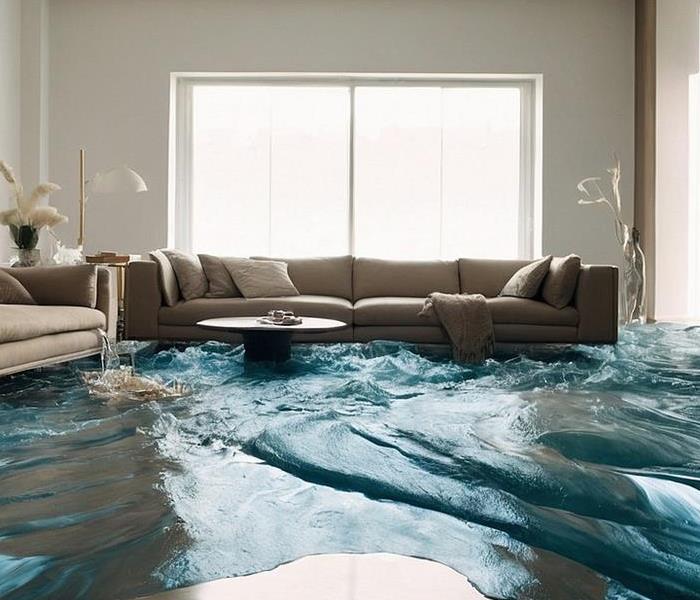Archived Water Damage Blog Posts
What To Do When You Have Water Damage
4/19/2024 (Permalink)
Water damage can wreak havoc on your home or property. Water damage can occur from burst pipes, leaking roofs, storms, floods, and hurricanes. The consequences can be devastating, leading to structural damage, mold growth, and potential health hazards.
When facing these situations, it is best to contact a restoration company such as SERVPRO®. However, here are some simple actions you can take while you wait on a SERVPRO® team to arrive at your home.
Turn off the Power
Attempt to safely switch off the electricity and gas to avoid electrocution and gas leaks. If unable to do so due to an extensive amount of water in the home, wait for a SERVPRO® team to arrive and cut the power off.
Locate and Stop the Water Source
Identify where the water is coming from. If it is coming from a burst pipe or leaking appliance, turn off the water supply to prevent further flooding.
If the source of the water is external, such as a storm or flooding, do your best to divert or contain the water from further damaging your home and furniture.
Remove Excess Water
Use pumps, wet/dry vacuums, buckets, or towels to remove as much water as possible from the affected area. The faster you can extract the water, the better chance you have of preventing further damage and mold growth.
Move Belongings Out of Water
To prevent further damage to your furniture, move them to another room that is dry. If you have heavy furniture that you are unable to lift and move around, wait for a SERVPRO® team to arrive to assist with moving the furniture.
SERVPRO® also specializes in restoring any piece of furniture that has been damaged during the disaster.
Call your Insurance Company
Once you have done all the above, now is the time to contact your insurance company and investigate what is covered in terms of water damage. Document the damage thoroughly and file a claim with your insurance as soon as possible in order for you to get reimbursed for the costs of mitigation.
Dealing with water damage is a long and stressful process. Luckily, SERVPRO® is available 24/7 with a team of certified professionals who are equipped with advanced equipment to resolve disasters like these.
SERVPRO®, the only restoration company that makes “Like it never even happened” happen.
Navigating Insurance Claims for Water Damage: Expert Tips and Tricks
3/28/2023 (Permalink)
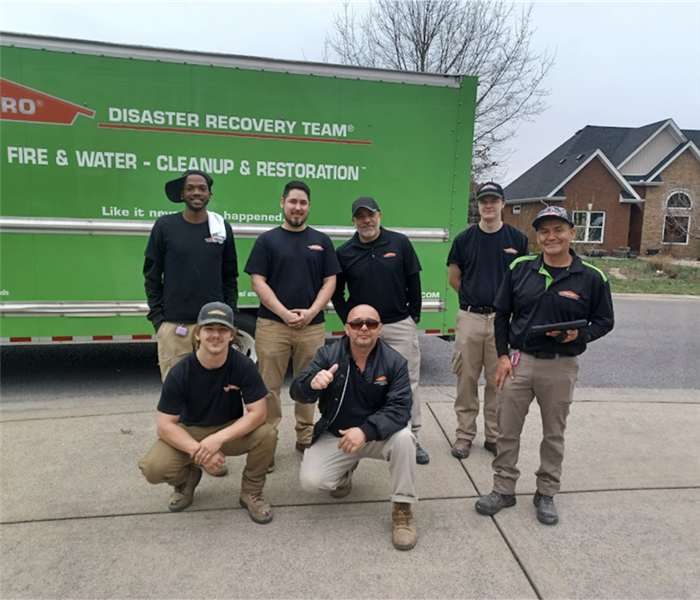 SERVPRO of Buford/Suwanee/Hamilton Mill is available 24/7/365 to respond to your emergency flood removal and water damage cleanup needs.
SERVPRO of Buford/Suwanee/Hamilton Mill is available 24/7/365 to respond to your emergency flood removal and water damage cleanup needs.
Dealing with water damage can be a stressful and overwhelming experience. Whether it's due to flooding, a burst pipe, or a leaking roof, water damage can wreak havoc on your property, possessions, and peace of mind. One of the critical aspects of handling water damage is navigating the insurance claims process. Knowing what to expect and how to maximize your claim can make a significant difference in your recovery. With many years of experience serving Buford, Suwanee, Hamilton Mill and surrounding areas, we wrote this blog to provide expert tips and tricks on navigating insurance claims for water damage. This way, you can secure the compensation you deserve while ensuring a smooth claims process.
Understanding Your Insurance Policy
The first step in navigating insurance claims for water damage is understanding your insurance policy. It's crucial to be familiar with the terms and conditions, as well as the extent of coverage provided. Some policies cover water damage from sudden and accidental events, while others exclude specific causes such as flooding. Here are a few tips to help you understand your policy:
- Review your policy documents and declarations page, which will outline your coverage limits and deductibles.
- Identify the specific perils covered and any exclusions, paying close attention to water damage-related incidents.
- Contact your insurance agent or company if you have any questions or need clarification about your coverage.
Documenting the Damage and Initiating the Claim
Once you have a clear understanding of your policy and coverage, it's time to document the damage and initiate your claim. Proper documentation is crucial in ensuring that your claim is processed accurately and efficiently. Follow these steps for documenting the damage:
- Take photographs and videos of the affected areas and any damaged items. Be thorough and capture images from different angles to provide a comprehensive visual record.
- Create a detailed inventory of damaged items, including their age, purchase price, and replacement cost.
- Keep receipts and invoices for any expenses related to the water damage, such as temporary accommodations or emergency repairs.
After documenting the damage, contact your insurance company to initiate the claim process. Be prepared to provide the necessary information, including the cause of the water damage, the extent of the damage, and your policy number.
Working with Commercial Restoration Services
In many cases, the best way to address water damage is by working with professional commercial restoration services. These experts have the knowledge, experience, and equipment needed to effectively mitigate and repair water damage. When selecting a water damage restoration company, consider the following:
- Choose a reputable company with experience in handling insurance claims like SERVPRO of Buford/Suwanee/Hamilton Mill. We can help you navigate the claims process and work directly with your insurer.
- Verify that the company is licensed, insured, and certified by industry organizations such as the Institute of Inspection, Cleaning and Restoration Certification (IICRC). Our technicians are trained through industry leading IICRC programs for your peace of mind.
- Request references and read reviews to ensure the company has a track record of success in water damage restoration. With over 150+ 5 star google reviews, our team has a track record of success that you can trust.
Involving commercial restoration services early in the process can expedite the insurance claim and increase the likelihood of a favorable outcome. These professionals can provide detailed estimates, documentation, and evidence to support your claim, ensuring you receive fair compensation.
Conclusion
Navigating insurance claims for water damage can be a daunting task, but with the right approach and assistance from professional commercial restoration services, you can successfully secure the compensation you deserve. By understanding your policy, documenting the damage, and working with experienced water damage restoration experts like our SERVPRO team, you can minimize the stress and financial burden associated with water damage recovery.
In case you need help with your water damage restoration project, give us a call at (770) 945-5355. We’re always here to help!
5 Easy Maintenace Tips to Help You Keep Your House Safe From Water Damage
3/14/2022 (Permalink)
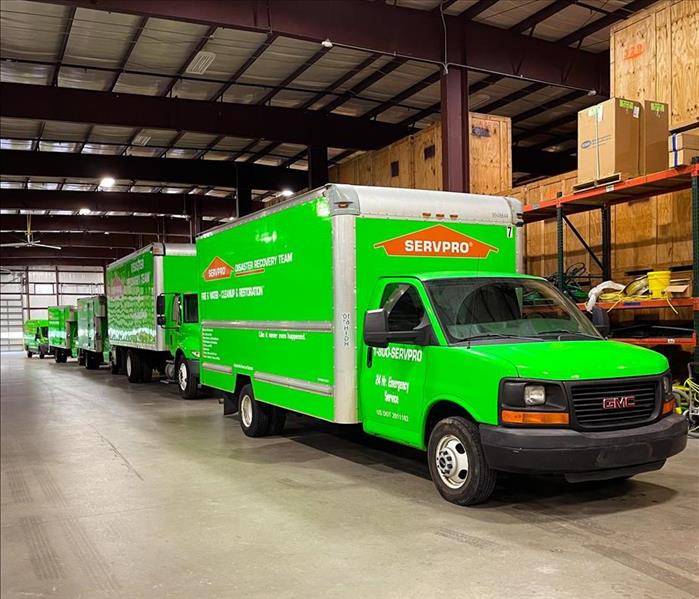 SERVPRO of Buford/Suwanee/Hamilton Mill keeps its trucks ready to respond immediately to your water damage emergency.
SERVPRO of Buford/Suwanee/Hamilton Mill keeps its trucks ready to respond immediately to your water damage emergency.
Water damage is an expensive and damaging occurrence. SERVPRO of Buford, Suwanee, and Hamilton Mill has discovered on numerous occasions that careful home or business property upkeep can decrease the risk and expenses of water damage. Living through a water damage restoration event can be stressful, but you can help prevent flooding from structural or routine maintenance concerns by following these simple tips.
1)To avoid dampness and moisture around your windows, replace old caulk around them.
We get a lot of calls for window caulking in Buford, GA and Suwanee, GA. Caulking your windows not only prevents water leaks, but it also helps to keep out drafts. It's a simple procedure that any homeowner can perform. Most window caulk should last approximately five years before needing to be replaced; however, you should check your caulking every year and replace it if it develops cracks or begins to pull away from the glass.
You should also inspect your exterior door flashings for any holes or rust that might allow water entry. You may also help prevent early flashing failure by properly caulking your doors.
2) To minimize water damage risk, check your water heater.
When it comes to our emergency water cleanup services, water heater problems are all too frequent. You may avoid a major water heater flood in your house by maintaining it on a regular basis. To prevent the formation of pressure that might result in a water leak, make sure the water heater's thermostat is set to regulate the temperature properly.
It's often the case that water heaters develop rust or silt inside, resulting in an odd taste or smell in the water. If your water starts to make unusual sounds, it may be time for a checkup or a new water heater.
3) Examine your water hoses and connections for leaks and replace them if they appear to be worn.
Look for any holes, kinks, fraying, wear, or corrosion on the hoses and connections. If you find any damage, get it fixed right away. To avoid unexpected water damage problems, most manufacturers and plumbers recommend replacing water hoses and connectors every 3-5 years.
4) Make sure the roof and gutters are clear of debris and that your attic shows no signs of moisture damage.
Rainwater backing up and overflowing onto your roof may harm the roofing material and seep into the house, causing problems.
Look for leaking flashing around vents, valleys, chimneys, pipes, and skylights. Anywhere on your roof where there are holes or connections is a potential source of leaks later on. If the flashing becomes deformed due to weather, rusted, or loses its seal, water might flow into your property.
Examine the interior of your attic for moisture or mold growth. If you detect damp, injured, or moldy insulation, decaying or discolored boards or ceiling panels, or puckering in the sheetrock, you may have a leak on your hands.
5) Check for any leaks or flooding in the HVAC condensation lines by cleaning and inspecting them.
When HVAC condensation lines are clogged, water leaks out, resulting in water damage and flooding in surrounding areas of your property. Check your condensation lines every month to ensure they're clean.
To clean out obstructions and grime from your condensate drain, pour one-half cup of plain, white vinegar four times a year down the drain. Bleach should not be used since it may damage your metal drain pan and result in deterioration. If you detect an abundance of debris or mold, our SERVPRO experts can assist you with any water damage cleanup.
We are Here to Help for All of Your Water Repair Needs
If you or someone you know need water damage repair service, contact our staff at SERVPRO of Buford/Suwanee/Hamilton Mill!
Save our phone number for when you need help in the future, or contact us right away for a quick response from one of our IICRC educated water restoration professionals.
We are always Here to Help!
Get Ready for a Water Heater Leak
1/26/2022 (Permalink)
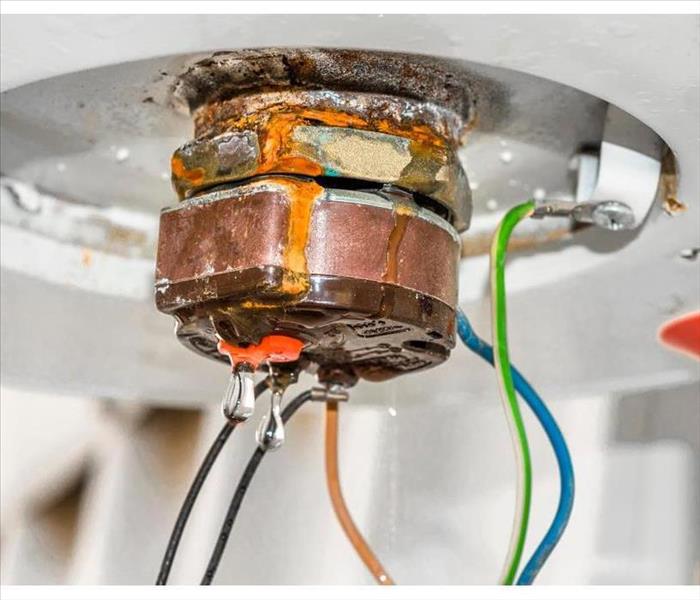 What to do when you have a broken water heater?
What to do when you have a broken water heater?
What To Do When a Water Heater Leaks
A failed water heater can leave a large mess behind, especially if that water tank is tucked in a closet near your main living space. You can minimize damage to your home in Hamilton Mill, GA, by acting fast to clean up the water. Read this now, so you know what to do when the time comes.
1. Stop the Bleed
Stop the water from continually pouring out of your leaking water heater, and reduce the amount of water that leaks into your home.
• Turn off the valve for the cold water pipe that leads into your tank.
• Connect a hose to the drain valve at the bottom of your tank, and redirect the water to an external location to help minimize damage.
2. Call for Help
If your leaking water heater leaves you with a substantial water mess, then calling for help is a good step before you do anything else. Professional water restoration specialists are experienced in resolving floods quickly and efficiently. When it comes to water, a company that is Faster to Any Size Disaster can save you money by reducing the exposure that can cause subsequent damage.
3. Actively Wait
Who says waiting is a passive activity? Even though professionals will come to complete the cleanup and restoration, you can do your part to reduce the damage caused by the leaking water heater. While you wait, you can:
• Remove standing water by absorbing the water with towels and rags or a mop.
• Protect wooden furniture legs by placing foil or blocks underneath the feet.
• Pick up any personal belongings out of the water and place them somewhere else to dry.
• Crank up the airflow by opening windows and doors, using fans or by using your HVAC system to help start the drying process.
You can minimize your exposure to water damage by knowing what to do when you have a broken water heater. Stopping the flow, calling for help and starting some cleanup on your own will all help reduce the amount of time your home is exposed to water. Professional water mitigators will do a thorough job using specialized equipment such as pumps and commercial air movers to remove water fast.
Drain Cleaner Deterioration and Your Home
12/22/2021 (Permalink)
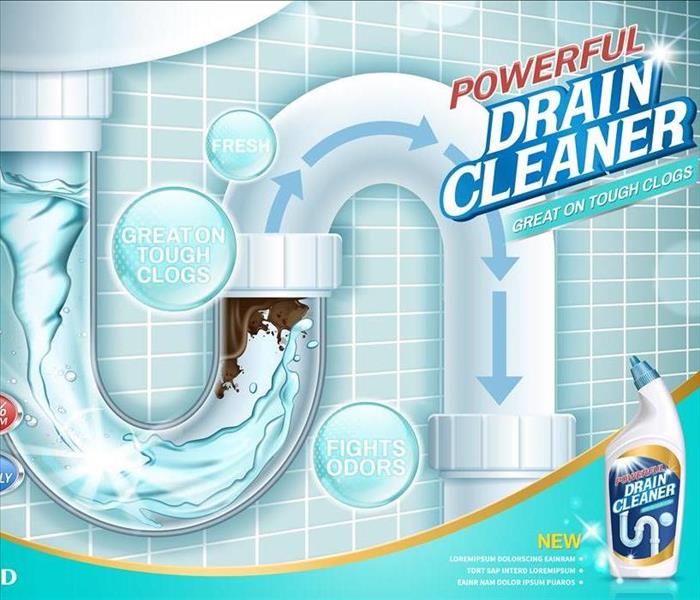 Chemical cleaners can be an effective solution for removing problematic clogs.
Chemical cleaners can be an effective solution for removing problematic clogs.
Deterioration of Drain Cleaners and Your Home
Chemical cleaners can be an effective solution for removing problematic clogs. However, they come with inherent risks and are not always superior to physically removing an obstruction with tools such as plungers or snakes. Consider the following factors when dealing with a clogged drain in Vanderbilt Beach, FL.
1. Health Concerns
Chemical treatments are typically made of lye, bleaches or certain acids. These cause a chemical reaction that changes the molecules of the clog, dissolving them in the drain cleaner substrate and producing heat and gases as a byproduct. Changing the composition of the clog is a potent remedy, but the resulting fumes can health effects. Backsplash or residue from the caustic agents can also eat away at skin.
2. Ecological Issues
Because of the reaction byproducts and leftover active liquid, chemical cleaners can also pose a hazard to waterways and wildlife further down from your residential sewer system. Enzymatic cleaners using natural bacteria may be a better option for the environmentally conscious homeowner facing a clogged drain.
3. Delaying the Inevitable
Because of the aggressiveness of the method, using store-bought chemical agents to remove tough clogs may result in ripple effects in other aspects of your plumbing. Certain acid-base reactions can wear down pipes more quickly than under normal water flow, resulting in cracked pipes. This is especially true of larger grease clogs where the chemical cleaner fails to break through and builds up at the point of constriction, concentrating at a metal juncture.
Furthermore, the breakdown of the mass can be incomplete and simply move it down the line, resulting in the need for an even larger and more expensive clog removal operation later on. These factors, if neglected, can result in the need for sewage cleaning by a qualified restoration service.
A clogged drain can be a major hassle, and the temptation to use the most potent products available is strong. However, judicious use of the full range of options is important to maintain the integrity of your pipes and appliances.
4 Steps To Take With a Contaminated Water Problem
11/29/2021 (Permalink)
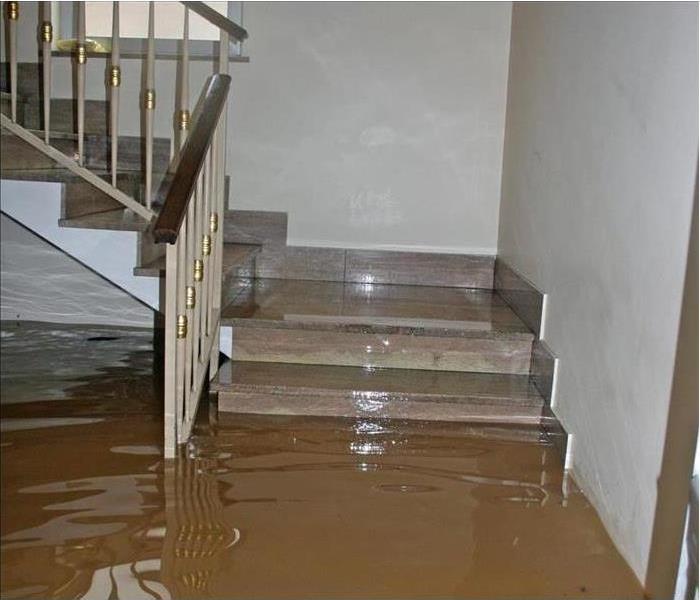 Blackwater in a home is high on the list of a homeowner's biggest worries.
Blackwater in a home is high on the list of a homeowner's biggest worries.
Four Things To Do Right Away
When water leaves its proper place and spills out onto floors and walls, it is always a cause for concern. When that water is filthy, either with raw sewage or other nasty substances, the problem quickly becomes a legitimate emergency. Blackwater in your home in Dacula, GA, should be addressed as soon as possible. Here are four things to do right away.
1. Keep Family and Pets Safe. Make sure everyone is out of the room that contains the dirty water. You never know what substances are in the water and what effects they could have on a person's skin, eyes, or health. Pets might wander in the room and drink the water and spread the tainted water throughout the rest of the home.
2. Call in Professionals. A sewage cleanup requires special knowledge and equipment. Certified technicians from a water mitigation company will use personal protective equipment to work on the problem, and they will use equipment designed to safely remove black water. They will place an emphasis on cleaning or replacing all materials that have been contaminated by the dirty water. In some cases, they will use advanced techniques such as a flood cut to restore areas of drywall and insulation that have received damage.
3. Fix the Problem. Whatever caused the category 3 water (the most unsanitary category of water) to overflow into the home, the situation should be fixed so it doesn't happen again. A licensed plumbing contractor might be needed.
4. Contact Insurance. Depending on the situation, your home insurance policy could cover the cost of cleanup and the replacement of damaged items. Your insurance agent can provide details of your coverage.
Blackwater in a home is high on the list of a homeowner's biggest worries. At first, the problem might seem insurmountable. With the right actions, though, you and your home can be on the way to a quick recovery.
Water Restoration - What Does It Mean?
11/4/2021 (Permalink)
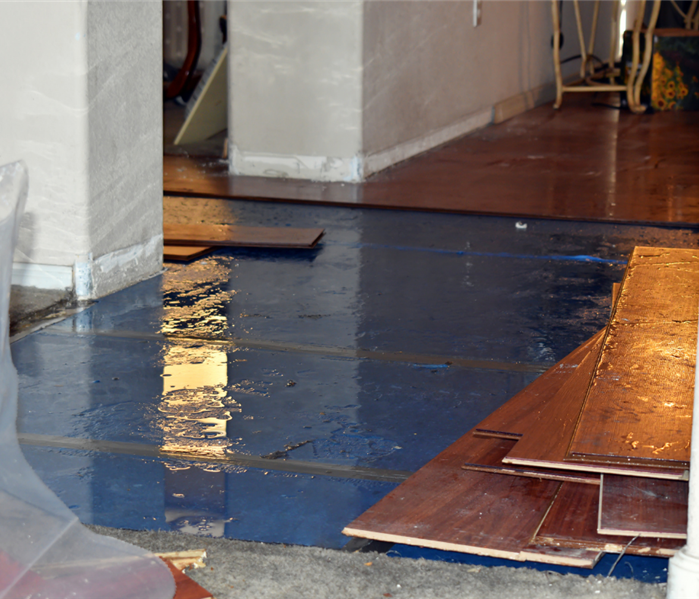 Water Damaged Floor Being Removed
Water Damaged Floor Being Removed
Who would have thought that water could cause so much damage? It’s amazing how quickly things can go from being okay to being completely ruined after just one little mishap with your plumbing, household appliances, or unexpected property damage. If you’ve ever had the misfortune of dealing with water damage, you know how hard it can be to have a company come in and clean up the mess—and you know how long it takes before things are back to normal.
What is Water Restoration?
Water restoration is a professional service that works to restore all areas damaged by water. Water damage happens when a lot of water encounters a surface, object, or other material. Generally, water can cause a substantial amount of damage to property and even lead to mold growth within less than 72 hours if left unchecked. Water restoration companies like SERVPRO of Buford can clean up any damaged floors, ceilings, and other surfaces in your home or office building after flooding or leaks have occurred.
When Do I Need Water Restoration?
Water restoration is a process by which any water damage caused in your house or office is repaired with the help of professional companies. We all know that one wrong step while doing DIY home projects can easily lead to damage to your property. Or maybe a strong storm or other natural events can cause water to enter your home and damage building materials. Even an aging building can more easily suffer from water damage. So, it's a good idea to consider calling SERVPRO of Buford/Suwanee/Hamilton Mill for water restoration services when you notice a leak, notice discoloration on your ceilings, walls, or other building materials, or if you start to smell mold or mildew inside. If you wait too long, you may have to spend more money on repairing it.
How Long Does Water Restoration Take?
If your house or office is suffering from water damage, call a professional restoration service right away. Usually, these companies like SERVPRO of Buford/Suwanee/Hamilton Mill offer same-day service and will begin work immediately after arriving at your home or business. Even so, they can’t just go in and start fixing everything; they need to know what’s been damaged by looking over things carefully and inspecting all surfaces for leaks and potential causes of loss. This step takes time, but it’s necessary for restoring everything to its pre-damage state.
Because so many factors come into play with water restoration, it can be hard to pinpoint an exact timeline until your property is fully restored. However, the building drying process typically takes at least 72 hours depending on the severity of the loss.
If you or your loved ones are experiencing a water emergency, our teams are available 24/7/365 to help you make your home "Like it never even happened."
Call us at 770-945-5355 for immediate assistance.
4 Ways Businesses Can Conserve Water
10/13/2021 (Permalink)
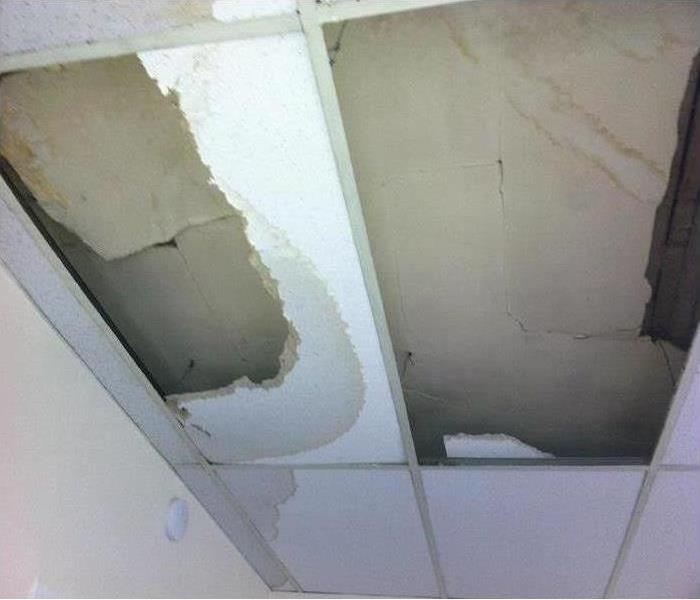 Ceiling damaged by a water leak.
Ceiling damaged by a water leak.
Ways You Can Prevent Potential Water Damage
In day-to-operations, it can be easy to forget that water is actually a scarce resource, which can be especially so when a Hamilton Mill, GA, business faces water issues. With potential rate increases and more people using that resources, businesses can make an impact by lowering consumption. Many of these easy solutions can also prevent potential water damage.
1. Check for Leaks
While sometimes they are obvious, leaks can be quite tricky. Checking the water bill for an increase in usage is one way to confirm there might be a hidden problem. If there has been an increase, consider getting your plumbing professionally inspected.
2. Conduct an Audit
Every business is different, as is how they use water. Local water companies often work with businesses to help them determine more efficient ways to use water, as well as tips to enhance existing systems.
3. Go Low-Flow
For businesses operating out of an older building, it may be time for a water upgrade. Newer sinks and toilets are designed to limit water waste. Low-flush toilets typically only use 1.6 gallons per flush compared to 5 gallons for older models. There are also low-flow faucets and other minimally expensive parts that can help you save on your water bill.
4. Landscape
Along with reducing irrigation needs, rethinking landscaping can also solve numerous water issues. Incorporating swales can direct stormwater runoff to a rain garden or other landscaping, reducing the need for watering the plant. Changing to native plants that require minimal maintenance also minimizes water consumption. Adding stone, pebbles or pervious paving will add a welcome aesthetic while reducing water use and preventing water damage that could result in needing a flooding and mold remediation and restoration professional.
Instead of dealing with water issues, such as high bills and leaks, set aside time to get the internal structural workings of your business optimally running. Even a few small changes can make a big difference.
How To Handle Burst Pipes and Flooding
6/24/2021 (Permalink)
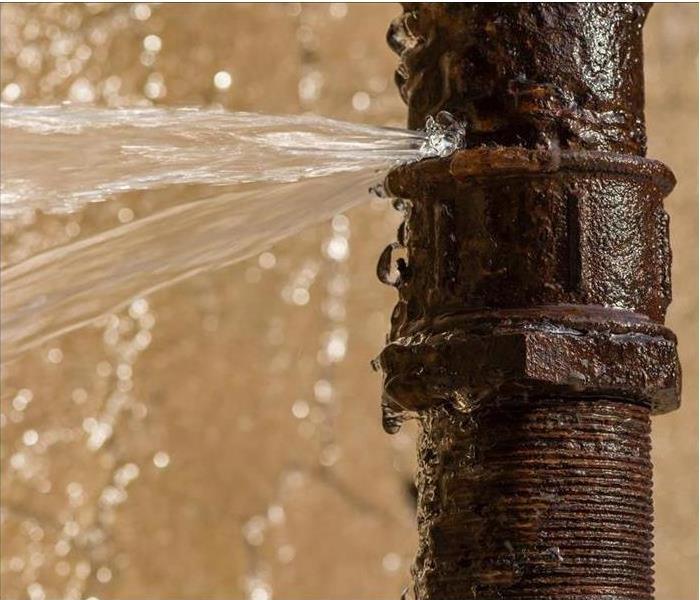 Bursting pipes can cause flooding in your property.
Bursting pipes can cause flooding in your property.
When bursting pipes cause flooding in the basement, your first step is to stop the water coming into the home; do this by shutting off the water main. The next step is to contact a professional for immediate remediation. At this point, you can begin removing water from your Hamilton Mill, GA, home. A word of caution: if there's any risk of electricity and water mixing, turn off the electricity before getting near the water.
Signs of Leaking Pipes
If you're lucky, you can catch the warning signs of hidden leaks before you have to deal with bursting pipes. If you recognize any of the following signs, act immediately to fix broken pipe hardware.
- Bulging walls, sagging ceilings, spongy flooring
- Stains on surfaces of the home
- Musty smell
- Unexplained increase in your water bill
- The appearance of mold or mildew on the walls
- A notice from your water meter
You may have lots of questions. Here are some of the answers you need.
1. How many days will the cleanup take?
The most accurate answer to this question is that it depends on what type of water flooded the basement, how long the water was there, and what type of materials were involved. However, most of the time, water damage takes about three to five days to clean up. If you had wood floors or other special circumstances, the damages may take about a week and a half.
2. What are the long-term results of water damage on my home?
Long after you fix broken pipe connections and other sources of flooding, you may find effects of direct water contact. Some of those results include sagging drywall, swelling wood, peeling paint, and damaged electronics. Anywhere water came in contact with the home, there is the potential for mold growth, as well.
3. Can't I handle bursting pipes on my own?
It is best to work with a remediation professional who understands the risks and the long-term consequences. If you want to avoid further damages and mold growth, discuss the situation with an expert.
Tips for Spotting and Fixing Water Damage
3/9/2021 (Permalink)
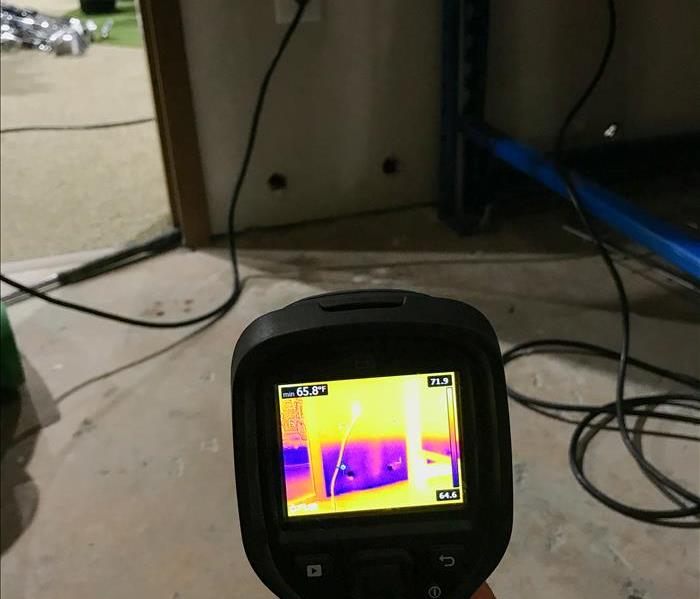 A water loss that led to mold damage.
A water loss that led to mold damage.
Water damage is a fairly common household problem. Pipes, over time, may develop weaknesses, allowing water to drip out and infiltrate the walls. The prompt reaction is essential to minimize the devastation; therefore, homeowners should understand how to notice early symptoms of the condition and be aware of ways to develop.
How Can You Spot Trouble?
Leaky or broken pipes may begin small, permitting moisture to seep into walls and crawl spaces. These places are hard to locate, allowing the saturation to develop over time. Owners are likely to start seeing outward signs after the concerns buildup. Try to catch water penetration early by keeping an eye out for the following symptoms:
- Discoloration or staining
- Rust buildup
- Warped floorboards
- Peeling paint
- Musty odors
How Should You Tend to the Issue?
Once you identify water damage, act swiftly to mitigate the impacted room. Locate a water restoration company in Buford, GA, to examine the area. The specialists use moisture reading tools to determine the extent of flooding and test samples of the drywall and air, looking for mold and mildew.
Focus on drying out space as much as possible. Run industrial dehumidifiers to extract moisture from the air and structure. Tear out drenched, porous materials. They harbor too much humidity and could allow mold and mildew to grow. Scrub the walls, and disinfect the premises to ensure fungus remains at bay.
How Do You Prevent Future Complications?
With water cleanup complete, concentrate on avoiding additional harm. Run the air handler to maintain a cool environment and monitor the humidity levels. Also, have professional plumbers inspect pipes regularly, checking for drips or structural changes. Making these small changes early could reduce the likelihood of major breaks.
Be on the lookout for unusual shifts in the home’s state. Water damage is best caught early to lower the costs of repairs and save owners significant hassles.
Tips To Protect Your Business From Disaster
2/11/2021 (Permalink)
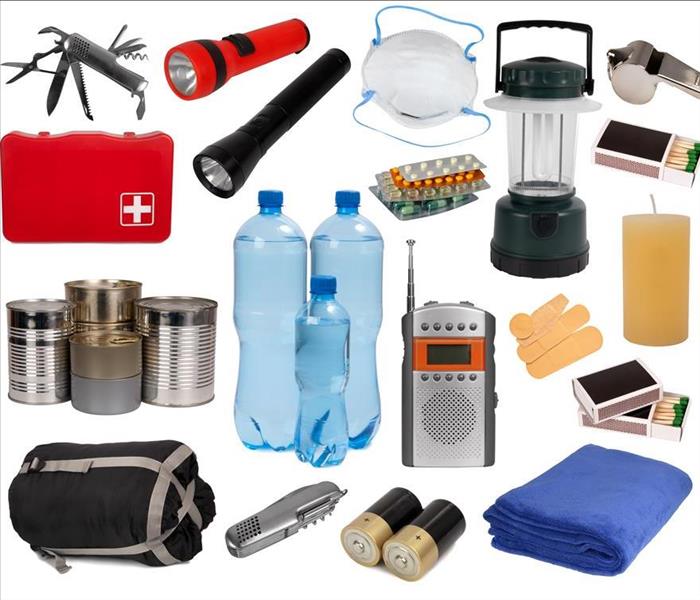 Emergency kit supplies.
Emergency kit supplies.
When severe weather strikes, you are undoubtedly worried about protecting your business. A tornado, hurricane, or severe downpour can cause flooding and physical damage to your building and affect your ability to sustain your regular business practices. Designing a custom emergency response plan can be invaluable if your Buford, GA business experiences a serious disruption.
Your Business Continuity Plan
Having a plan that addresses all types of potential damage is essential to your company’s risk-management strategy. These steps may help you create a solid plan that protects you.
Identify the risks particular to your business, such as a nearby flood plain, coastal hurricane vulnerability or a basement that often floods.
Assess the potential impacts on your staff, your property and your daily operations for each risk category.
Outline preventive measures that address each risk area, such as flood-prevention maintenance or fire-safety planning.
Formulate the specific steps to be followed by you and your staff in case of an emergency.
Regularly review, update and test your business continuity plan with live drills.
A well-designed plan can give you and your workforce a better chance of working together to prevent damage and minimize property loss.
Emergency Preparedness Tips
As part of your plan, you may want to keep an emergency kit on site. The kit might include items such as water, flashlights, extra batteries, protein bars, and a medical first-aid kit. It is also important to make sure you have fire extinguishers placed throughout your building. Many businesses find that a local fire department or disaster remediation service will happily offer your staff training in fire extinguisher operation, evacuation procedures and other preventive measures. For more detailed information about continuity planning and disaster preparedness, you can consult government resources like Health and Human Services or Federal Emergency Management Agency.
This brief overview may help you formulate a business continuity plan that can both protect your business and your peace of mind. Disaster preparedness may not be at the top of your list, but it can make a big difference when your property and your bottom line are threatened by an emergency.
3 Ways To Prevent Bursting Pipes in the Winter
12/28/2020 (Permalink)
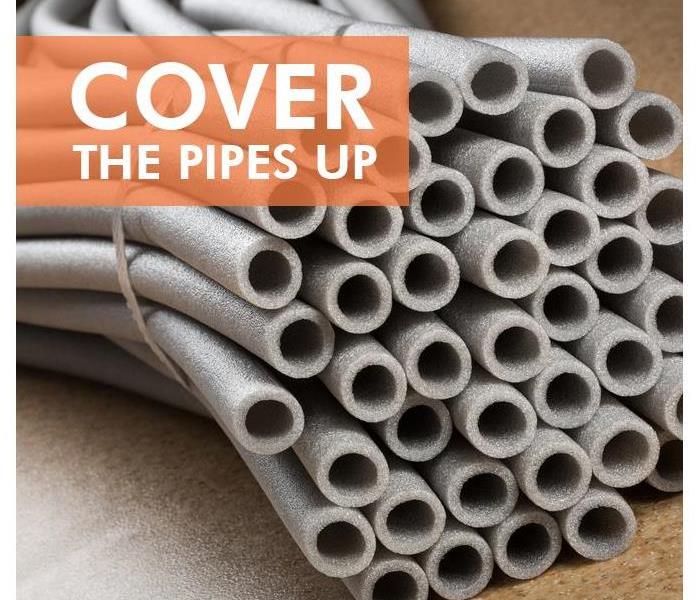 Insulate your pipes
Insulate your pipes
Ways To Prevent Bursting Pipes In The Winter
Throughout the winter, homeowners in Suwanee, GA, know they must prepare adequately to prevent a house flood. Causes for bursting pipes include:
- Frozen pipes
- High water pressure
- Old plumbing systems
The aftermath of a burst pipe can be devastating for your home, causing severe water damage to your property and hours of water cleanup. During colder times of the year, you can ensure your pipes are protected from the frost by taking these steps.
1. Insulate Your Pipes
Installing insulation around your pipes before winter begins protects them from freezing temperatures. Insulation keeps the cold air from affecting any exposed or external plumbing. Though it may seem costly initially, a layer of insulation keeps your pipes protected for years after having it installed, saving you from the more expensive repairs and water damage restoration service needed after bursting pipes.
2. Open Your Faucets to a Drip
Due to the freezing cold temperatures, burst pipes are more frequent during the winter. Frozen water inside of the pipes increases the water pressure. The increased pressure builds and eventually causes the pipes to burst. Keeping the water running at a drip relieves the water pressure inside of the pipes, keeping them from bursting.
3. Open Cabinets in Bathrooms and Kitchens
Allowing the warm air in your house to travel around water supply lines, which are located in your kitchen and bathroom, can keep them warm enough to prevent freezing inside the pipes. This avoids any burst water supply lines. To protect water supply lines during the winter, open the cabinets where this plumbing is located so your heated air can reach them.
Avoid having to call a plumber to fix a broken pipe by taking preventative measures before and during winter. Preparing for the winter can ensure your plumbing is protected from freezing temperatures and save you the cost of repairs from bursting pipes.
5 Tips for Dealing With a Toilet Overflow
11/23/2020 (Permalink)
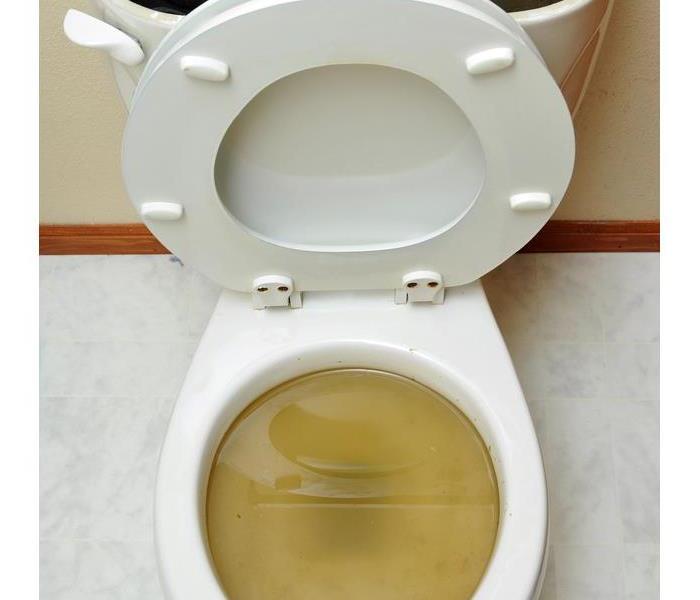 Toilet overflow in Buford, GA
Toilet overflow in Buford, GA
Here Are Five Tips For Dealing With This Type Of Problem
When dealing with sewer damage in your Buford, GA, home, you may be wondering what steps to take. Whether it’s overflow from a sewer main maintained by the sewage company, or a blockage that led to a flooded toilet, there’s some important things to remember about dealing with a toilet overflow.
1. Contact a Professional
One of the first things to consider any time you have a sewer problem in your home is to contact a local water damage restoration service. These professionals are trained to deal with a number of water damage types, including sewage backup. They will have the tools and training needed to do so safely.
2. Wear Safety Gear
Sewage is classified as black water meaning that it carries contaminants such as chemicals or bacteria. This is why it’s important to wear protective equipment any time you deal with it. This may include masks, gloves, shoe covers, and clothing covers.
3. Remove the Water
One of the first things you will see your sewer damage restoration team do is remove the water before additional problems can arise. They may use special pumps or vacuums for this job, and pay special attention to tights spaces where water may be hard to get at.
4. Dry the Space
Once the water is removed it is important to dry the space. This is to help prevent water from soaking in and causing additional problems such as swollen wood or mold.
5. Sanitize the Area
Because sewage is contaminated, after it is removed and the area dries, the space will need to be sanitized. Your restoration teach will use a variety of cleaners designed to work on the different affected surfaces.
It’s important to remember that sewer damage can be tricky to deal with. This is why it’s highly recommended to contact a professional restoration service for help. These professionals will have the correct safety gear needed for dealing with the problem so that they can remove the water, dry the area, and correctly sanitize the space. Soon your home can look “Like it never even happened.”
Performing a Water Heater Flush
10/13/2020 (Permalink)
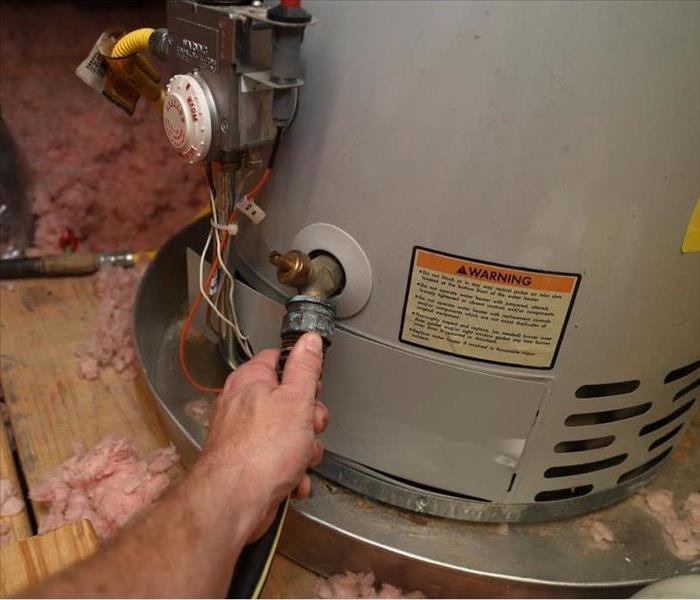 Performing a flush is an excellent way to keep your water heater properly maintained
Performing a flush is an excellent way to keep your water heater properly maintained
Steps To Perform a Water Heater Flush
Proper water heater maintenance can help prevent unnecessary damage and repairs, as well as keep your device functioning properly for years to come. Performing a water heater flush is an essential, yet simple, task. Follow the steps below to perform a successful flush for your home in Sugar Hill, GA.
1. Deactivate the Machine.
If you have a gas model, simply extinguish the pilot light. If you have an electric model, go to the circuit box and deactivate the line supplying the heater.
2. Prepare the Drainage Area and Connect the Garden Hose.
Designate a specific drainage area for your flush. The area you choose should be able to handle a significant amount of warm water flow, without running the risk of flooding your property. Connect one end of your garden hose to the heater's drain valve before running the opposite end into the designated drainage area.
3. Drain Your Tank.
Open your drain valve to let the water out. Allow it to flow for several minutes. During this time, you should head into your kitchen and activate the warm water faucet in your sink. This helps the water drain more smoothly. After a few minutes, turn off the supply valve. The water should gradually begin to slow before stopping altogether. Reopen the valve to run one more quick flush before shutting it off again.
4. Close the Valves and Refill the Tank.
Close your valves and turn your water supply back on. During this time, keep a close eye on the running faucet in your kitchen. You'll know that your heater's tank is full again once the water begins to run smoothly from the faucet.
5. Reactivate the Heating Element.
Refer to step one to reactivate your heater's power. You have now performed a successful water heater flush.
Performing a flush is an excellent way to keep your water heater properly maintained, ensuring that you'll be able to use the device for years to come. For more information or assistance maintaining your device, contact water remediation experts.
3 Common Sewage Issues Found in Commercial Buildings
9/9/2020 (Permalink)
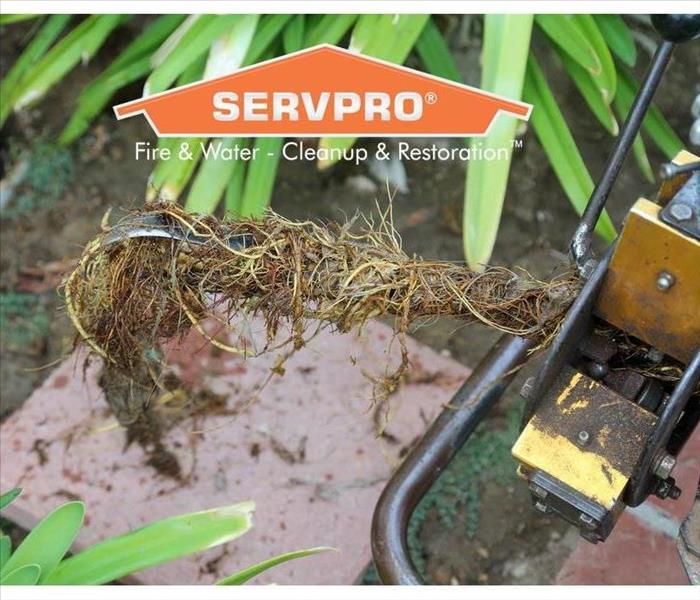 Tree roots growing in the sewer line is a common reason for sewer backup problems
Tree roots growing in the sewer line is a common reason for sewer backup problems
Here Are Three Common Issues
One of the biggest repair headaches for business owners in Rest Haven, GA, is when the plumbing goes awry. It's more common for these mishaps to occur in older buildings, but sewage disasters, such as a blocked sewer system, can happen at any place and time. Knowing the signs of an issue before it gets worse is key to saving your property and your bank account.
Here are three common issues. You'll want to know how to identify them before the problem is so large that you need to call the disaster pros.
1. Sewer Lines
Unfortunately, sewer lines aren't made to last forever. Cast iron sewer lines can last up to 25 years, which isn't long when you consider a building of that age is still fairly young. When a sewer pipe breaks there are several telltale signs, the most obvious being odor. Other telltale signs of a sewer line break would be regularly clogged drains and indentions in the landscape.
2. Blocked Lines
Sewer lines can also cause trouble when they become blocked. Unlike a break, you may have an opportunity to catch the problem before it causes damage. An obvious sign of a blocked sewer line is the sound of water bubbling. If you hear the sound of water bubbling, a toilet overflow is just waiting to happen, so act quickly at the first sign of a blocked line.
3. Tree Roots
While pipes will give out over time, their life can be cut short when tree roots force their way in. Tree roots can break and block sewer lines — the worst of both worlds. Fortunately, once you've identified the issue, you can take preventative maintenance precautions to make sure blocked sewer lines don't occur again.
Knowing the signs of impending and already occurring sewer issues can save you headaches and money. Be sure to check your insurance policy so that you know what sewer problems your coverage will handle should you run into one of these problems.






 24/7 Emergency Service
24/7 Emergency Service
